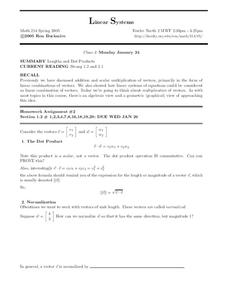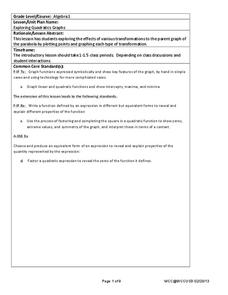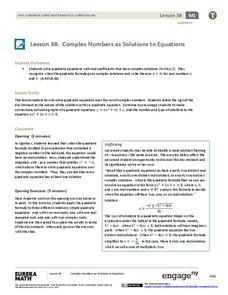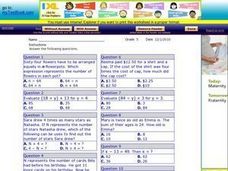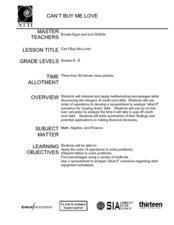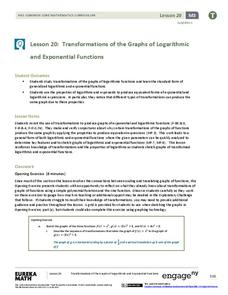Curated OER
Turvey of Related Rates
In this algebra activity, students practice using related rates while solving word puzzles. They rewrite words using the correct math to do so. There is an answer key with this assignment.
Curated OER
Linear Systems
For this multiplication of vectors worksheet, students prove that the dot product operation is commutative. They normalize a vector so it has the same direction with a magnitude of one. Students use the angle formula to confirm...
Curated OER
Ten in the Bed
First graders share the story "Ten in the Bed". They rewrite the story so that the initial character is calling others to bed. There was one in the bed and the little one said, "Come to bed, come to bed." There were two in the bed and...
West Contra Costa Unified School District
Solving Exponential Equations
The power to solve exponential equations lies in the resource. Scholars first learn how to solve exponential equations. An activity matching cards with equations, intermediate steps, and solutions strengthens this skill.
West Contra Costa Unified School District
Exploring Quadratics and Graphs
Young mathematicians first graph a series of quadratic equations, and then investigate how various parts of the equation change the graph of the function in a predictable way.
EngageNY
Complex Numbers as Solutions to Equations
Quadratic solutions come in all shapes and sizes, so help your classes find the right one! Learners use the quadratic formula to find solutions for quadratic equations. Solutions vary from one, two, and complex.
West Contra Costa Unified School District
Solving Equations Using Balance Scale, Decomposition, and Graphing
There's more than one way to solve an equation — three, actually. Scholars learn how to solve simple linear equations in one variable using three different methods, which include using balance scales, using decomposition (e.g., turning...
Curated OER
Regents Exam: Solving Rationals 1
In this rational number worksheet, students add and subtract fractions containing variables. They find common denominators and solve for the unknown. This four-page worksheet contains eighteen problems. Answers are listed on the last...
Curated OER
Square and Triangular Numbers
Young scholars use equations to represent practical situations. They solve linear equations and quadratic equations. The use of problem solving strategies is also developed.
Curated OER
Triangular Numbers
Young scholars are introduced to the problem and brainstorm ideas for approaching the problem and keeping track of what has been done. They work in pairs and share their answers, explaining their reasoning.
Curated OER
Using inverse Operations to Solve Equations
Fifth graders solve equations. In this algebraic equations lesson plan, 5th graders use the inverse operation to solve an equation. The teacher reminds students to perform the operation on both sides of the equation. This lesson plan...
Curated OER
The Shortest Distance
Students, working on their GED, examine the steps used to resolve the unknown sides of a right triangle. They express the square root function as an exponential function and derive the distance formula using principles of geometry.
Curated OER
Mathematical Relationships
Students practice graphing a linear equation and a parabolic equation. They work cooperatively to select numbers, including fractions, which they will put into ordered pairs. Students explain their process to the class, discussing what...
Curated OER
Rings and Diamonds
Fifth graders solve a problem by using systematic problem solving strategies. They determine if there is enough information to solve the problem. They solve a problem involving geometric shapes and area.
Curated OER
Equation Word Problems, Vol. 1
Learners solve word problems and regular number problems having to do with equations with variables. They complete 10 problems.
Curated OER
Four Fours Challenge
Second graders look at the number patterns created when tins are stacked in different arrangements. The aim of the unit is for students to keep track of the numbers involved by drawing up a table of values. They are then encouraged to...
Curated OER
Properties of Logarithms
Eleventh graders investigate logarithms. In this Algebra II lesson, 11th graders explore the properties of logarithms that are used to simplify expression and solve equations. Students confirm their conjectures regarding the...
Curated OER
Comparing Candy Bars
Eighth graders identify that a ratio is a comparison of two numbers and that a proportion is an equation that equates two ratios. They identify the extremes and means of proportions, as well as the product of the extremes equals the...
Curated OER
Pepe Cleaners
Seventh graders gather data to determine the relationships between the base and height of rectangles with fixed perimeters and express the relationships using words and symbols. Students build rectangles with pipe cleaners. They create...
Curated OER
Cannot Buy Me Love
Young scholars investigate the concepts that are related to finance and how it is used in the world. They take part in activities that are focused around the use of a spreadsheet while using a T-chart to simulate a ledger of credits and...
Curated OER
Choices
This unit is about making calculations in the real life situations of taxis, hire cars, and cell phones. They find and justify a word formula which represents a given practical situation. Solve simple linear equations such as 2? + 4 = 16.
EngageNY
The “WhatPower” Function
The Function That Shall Not Be Named? The eighth installment of a 35-part module uses a WhatPower function to introduce scholars to the concept of a logarithmic function without actually naming the function. Once pupils are...
EngageNY
Transformations of the Graphs of Logarithmic and Exponential Functions
Transform your lesson on transformations. Scholars investigate transformations, with particular emphasis on translations and dilations of the graphs of logarithmic and exponential functions. As part of this investigation, they examine...
EngageNY
Choosing a Model
There's a function for that! Scholars examine real-world situations to determine which type of function would best model the data in the 23rd installment of a 35-part module. It involves considering the nature of the data in addition to...

